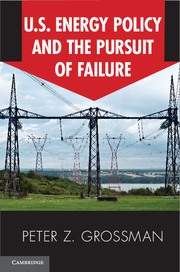2 - Failure
Published online by Cambridge University Press: 05 March 2013
Summary
The first assumption for any commercialization activity by the government is that the market either has failed or will fail to make the optimum choice. It may be a failure in selection, i.e. the market will not select the “proper” process or product, or it may be a failure in timing, i.e. the market will not make its choice at the proper time – will not commercialize soon enough. In either case, the basic presumption is that the government policy maker can make a better selection than can the market.
– Unsigned Carter administration document “Competitive Considerations in Government Commercialization Projects,” March 1979, emphasis in the original.The Premise of U.S. Energy Policy
This book is about the serial failures of U.S. energy policy, failures that have been extraordinarily wasteful, with little learned by policy makers in the process. Congresses and presidential administrations cannot seem to find new answers to lingering questions and so have repeated failed policies because they appear to promise solutions that in reality they do not and cannot provide. But they are politically expedient even if the chances of practical success are close to zero.
The book is also about the premises and goals behind those futile attempts at policy, which are themselves based on failure of a different sort. For if energy markets clearly provided for our energy needs efficiently and equitably, without disruption or discomfort, there would be no need for any sort of energy policy except for a one-sentence plan: “Let the markets decide.” But instead, most policy makers have at least tacitly assumed that America needs to have a top-down comprehensive energy policy because energy markets have failed.
- Type
- Chapter
- Information
- US Energy Policy and the Pursuit of Failure , pp. 45 - 66Publisher: Cambridge University PressPrint publication year: 2013

